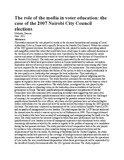| dc.description.abstract | This study examined the role played by media in the electoral formations and running of Local Authorities (LAs) in Kenya with a specific focus on the Nairobi City Council. Within the context of the 2007 general elections, the study explored the role played by media in providing salient and insightful content for voters that could have been relied upon to make informed decisions in the election of civic leaders in that election year. Specifically, the study examined the media content and nature of information availed to voters with regard to the election of Councillors to the Nairobi City Council.
The study was primarily motivated by the well-documented phenomena of a failed local government system in Kenya symbolised by endemic corruption, deplorable delivery of services such as sanitation, infrastructure and security among other basic services required for the wellbeing of residents within LAs jurisdictions. The study shows from various commentators and scholars that failure of the system to deliver is largely attributable to the low-quality civic leadership that manages the local authorities. This leadership is characterized by low levels of educational qualifications, frequent political infighting and the mismanagement of local resources.
The study therefore examined the electoral processes that appear to regularly deliver low caliber leadership into these institutions, and the basis on which voters elect their civic representatives. The study further investigated the role played by the mainstream media in educating voters on the leadership choices available at this level of governance in Kenya.
The basic qualifications and management competencies of elected Councillors were also examined with compelling secondary data suggesting that many civic leaders lack the educational qualifications and work experience needed to tackle the challenges of running LAs competently. The study investigated the possible reasons behind the low qualifications threshold for civic offices, why these elective positions have not attracted higher caliber individuals over the years and how the media tackled this subject during the 2007 general elections.
The study also conducted an assessment of the Local Authority Transfer Fund (LATF) and its quality of management by civic leaders. The study argues that the LATF has not achieved the desired aims for which it was set up by an Act of Parliament in 1999. This is largely blamed on civic leaders who have been accused of mismanaging and misappropriating the funds over the years. The study unravels the intricate linkages between this poor performance and the basic qualifications of civic leaders in terms of managerial experience and educational levels, while examining information availed by the media in regards to the profiles of aspiring civic candidates during the last general elections.
The study provided a brief comparative look at the role played by media in voter education in other countries during local government elections and the implications of this for our media. By looking at Botswana and the United Kingdom, the study investigated media best practices in the coverage of local government operations and elections in democratic countries that have well- managed cities.
Finally, the study delved into the operations of LAs under the new constitutional dispensation where local governments will be superseded by the devolved County Governments after the 2012 general elections. The study explored opportunities arising for the media in influencing better management of the County Governments through voter education and enlightened citizen participation in the election of their county representatives. The study findings therefore come at an opportune time when the country is grappling with the future of Local Governments under the new constitutional framework that commenced after 27th August, 2010. | en_US |

